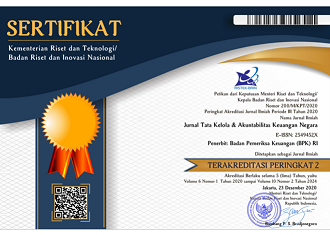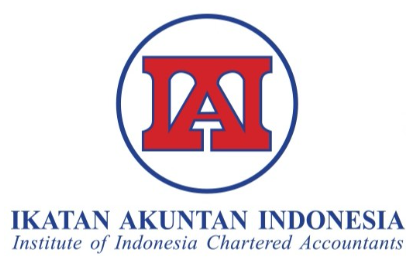Political Budget Cycle and Financial Losses: An Indonesian Case
DOI:
https://doi.org/10.28986/jtaken.v7i2.668Keywords:
Expenditure Composition, Local Elections, Local Government Financial Losses, Political Budget CycleAbstract
This study aims to test the Political Budget Cycle (PBC) in Indonesia as one of the world's largest democracies, specifically testing the presence of PBC across types of local government expenditures. This study further analyzed the effect of changes in expenditure composition during election years on financial local government losses. The financial losses are defined as irregularities in regional finance management found in the Audit Board of The Republic of Indonesia (BPK) audit report. This study uses the data at the district and city levels (local expenditures and financial losses) from 2014 to 2019 and adopts a fixed-effect panel data specification. The empirical estimations show the following evidence: (1) PBC phenomenon occurs in Indonesia, especially on government grants (belanja hibah), expenditure on goods and services, and capital expenditures; (2) There was no difference in PBC behavior between a region having an incumbent running for re-election and a region with incumbents from the previous election; (3) The existence of PBC tend to increase local government (financial) losses.
References
Alesina, A. (1987). Macroeconomic policy in a two-party system as a repeated game. The Quarterly Journal of Economics, 102(3): 651-678. DOI: 10.2307/1884222
Astuti, Y. D., & Adrison, V. (2019). The Audit Board of Republic of Indonesia opinion and bribery in local governments in Indonesia. Jurnal Tata Kelola dan Akuntabilitas Keuangan Negara, 5(2), 125-138. DOI: 10.28986/jtaken.v5i2.379
Besley, T., & Case, A. (1995). Does electoral accountability affect economic policy choices? Evidence from gubernatorial term limits. The Quarterly Journal of Economics, 110(3), 769-798. DOI: 10.2307/2946699
Besley, T. (2006). Principled agents?: The political economy of good government. Oxford University Press on Demand.
BPK RI. (2014a). Summary of Semester Audit Results I Year 2014 (Ikhtisar Hasil Pemeriksaan Semester, IHPS I Tahun 2014). Retrieved from https://www.bpk.go.id/ihps
BPK RI. (2014b). Summary of Semester Audit Results II Year 2014 (Ikhtisar Hasil Pemeriksaan Semester, IHPS II Tahun 2014). Retrieved from https://www.bpk.go.id/ihps
BPK RI. (2015a). Summary of Semester Audit Results I Year 2015 (Ikhtisar Hasil Pemeriksaan Semester, IHPS I Tahun 2015). Retrieved from https://www.bpk.go.id/ihps
BPK RI. (2015b). Summary of Semester Audit Results II Year 2015 (Ikhtisar Hasil Pemeriksaan Semester, IHPS II Tahun 2015). Retrieved from https://www.bpk.go.id/ihps
BPK RI. (2016a). Summary of Semester Audit Results I Year 2016 (Ikhtisar Hasil Pemeriksaan Semester, IHPS I Tahun 2016). Retrieved from https://www.bpk.go.id/ihps
BPK RI. (2016b). Summary of Semester Audit Results II Year 2016 (Ikhtisar Hasil Pemeriksaan Semester, IHPS II Tahun 2016). Retrieved from https://www.bpk.go.id/ihps
BPK RI. (2017a). Summary of Semester Audit Results I Year 2017 (Ikhtisar Hasil Pemeriksaan Semester, IHPS I Tahun 2017). Retrieved from https://www.bpk.go.id/ihps
BPK RI. (2017b). Summary of Semester Audit Results II Year 2017 (Ikhtisar Hasil Pemeriksaan Semester, IHPS II Tahun 2017). Retrieved from https://www.bpk.go.id/ihps
BPK RI. (2018a). Summary of Semester Audit Results I Year 2018 (Ikhtisar Hasil Pemeriksaan Semester, IHPS I Tahun 2018). Retrieved from https://www.bpk.go.id/ihps
BPK RI. (2018b). Summary of Semester Audit Results II Year 2018 (Ikhtisar Hasil Pemeriksaan Semester, IHPS II Tahun 2018). Retrieved from https://www.bpk.go.id/ihps
BPK RI. (2019a). Summary of Semester Audit Results I Year 2019 (Ikhtisar Hasil Pemeriksaan Semester, IHPS I Tahun 2019). Retrieved from https://www.bpk.go.id/ihps
BPK RI. (2019b). Summary of Semester Audit Results II Year 2019 (Ikhtisar Hasil Pemeriksaan Semester, IHPS II Tahun 2019). Retrieved from https://www.bpk.go.id/ihps
BPS. (2013). Indonesia Population Projection 2010-2035 (Proyeksi Penduduk Indonesia 2010-2035). Retrieved from https://www.bps.go.id/
BPS. (2019). Gross Regional Domestic Product of Regencies/Municipalities in Indonesia 2014-2018 (Produk Domestik Regional Bruto Kabupaten/Kota di Indonesia 2014-2018). Retrieved from https://www.bps.go.id/
BPS. (2020). Gross Regional Domestic Product of Regencies/Municipalities in Indonesia 2015-2019 (Produk Domestik Regional Bruto Kabupaten/Kota di Indonesia 2015-2019). Retrieved from https://www.bps.go.id/
Darmastuti, D., & Setyaningrum, D. (2019). The effect of discretionary spending on incumbent victories in elections. Humanities and Social Sciences Reviews, 7(4), 685-693. DOI: 10.18510/hssr.2019.7488
Drazen, A., & Eslava, M. (2010). Electoral manipulation via voter-friendly spending: Theory and evidence. Journal of Development Economics, 92(1), 39-52.
Ferraz, C., & Finan, F. (2008). Exposing corrupt politicians: The effects of Brazil's publicly released audits on electoral outcomes. The Quarterly Journal of Economics, 123(2), 703-745.
Ferraz, C., & Finan, F. (2011). Electoral accountability and corruption: Evidence from the audits of local governments. American Economic Review, 101(4), 1274-1311. DOI: 10.1257/aer.101.4.1274
Figueroa, V. (2021). Political corruption cycles: High-frequency evidence from Argentina's notebooks scandal. Comparative Political Studies, 54(3-4), 482-517. DOI: 10.1177/0010414020938102
Henderson, J. V., & Kuncoro, A. (2011). Corruption and local democratization in Indonesia: The role of Islamic parties. Journal of Development Economics, 94(2), 164-180.
Hessami, Z. (2014). Political corruption, public procurement, and budget composition: Theory and evidence from OECD countries. European Journal of Political Economy, 34, 372-389.
Hopkin, J., & Rodríguez-Pose, A. (2007). "Grabbing hand" or "helping hand"?: Corruption and the economic role of the state. Governance, 20(2), 187-208. DOI: 10.1111/j.1468-0491.2007.00353.x
Kis-Katos, K., & Sjahrir, B. S. (2017). The impact of fiscal and political decentralization on local public investment in Indonesia. Journal of Comparative Economics, 45(2), 344-365. DOI: 10.1016/j.jce.2017.03.003
Klein, F. A., & Sakurai, S. N. (2015). Term limits and political budget cycles at the local level: Evidence from a young democracy. European Journal of Political Economy, 37, 21-36. DOI: 10.1016/j.ejpoleco.2014.10.008
KPU. (2017). Penyelenggaraan Pilkada Serentak 2015 dan 2017. Retrieved from https://issuu.com/cecephusnimubarok/docs/ebook-pilkada_2015_2017
Krisnawati, R. (2019). Peran fragmentasi politik dan akses media dalam fenomena political budget cycle dan strategi pemenangan petahana. (Unpublished doctoral’s dissertation). Universitas Indonesia, Depok, Indonesia.
Krueger, A. O. (1974). The political economy of the rent-seeking society. The American Economic Review, 64(3), 291-303.
Kuncoro, A., Adrison, V., & Isfandiarni, I. (2013). Varieties of governance of public goods delivery in Indonesia: The case of roads after decentralization and local democratization. Institute of Economic and Social Research, Faculty of Economics, University of Indonesia.
Law of The Republic of Indonesia Number 1 of 2004 concerning The State Treasury (Undang-Undang Republik Indonesia Nomor 1 Tahun 2004 tentang Perbendaharaan Negara). Retrieved from https://www.bpk.go.id/assets/files/storage/2013/12/file_storage_1386152400.pdf
Lewis, B. D., & Hendrawan, A. (2019). The impact of majority coalitions on local government spending, service delivery, and corruption in Indonesia. European Journal of Political Economy, 58, 178-191. DOI: 10.1016/j.ejpoleco.2018.11.002
Lewis, B. D., Nguyen, H. T., & Hendrawan, A. (2020). Political accountability and public service delivery in decentralized Indonesia: Incumbency advantage and the Performance of second term mayors. European Journal of Political Economy, 64(C). DOI: 10.1016/j.ejpoleco.2020.101910
Lewis, B. D. (2020). How do mayors get elected? The causal effects of pre-electoral coalitions on mayoral election outcomes in Indonesia. Local Government Studies, 46(3), 394-413. DOI: 10.1080/03003930.2019.1627334
Lopes da Fonseca, M. (2016). Candid lame ducks. CESifo Working Paper Series, 5733.
Nordhaus, W. D. (1975). The political business cycle. The Review of Economic Studies, 42(2), 169-190. DOI: 10.2307/2296528
Olmos, L., Bellido, H., & Román-Aso, J. A. (2020). The effects of mega-events on perceived corruption. European Journal of Political Economy, 61(C). DOI: 10.1016/j.ejpoleco.2019.101826
Potrafke, N. (2019). Electoral cycles in perceived corruption: International empirical evidence. Journal of Comparative Economics, 47(1), 215-224. DOI: 10.1016/j.jce.2018.11.003
Priyono, S., & Wagner, N. (2018). Political budget cycles at the sub-national level: Evidence from the Indonesian simultaneous regional election in 2015. The Indonesian Journal of Development Planning, 2(3), 203-218. DOI: 10.36574/jpp.v2i3.38
Priyono, S. H., & Sastiono, P. (2019). Re-running eligibility on fiscal spending behavior: Evidence from Indonesian municipalities. The Indonesian Journal of Development Planning, 3(1), 143-163. DOI: 10.36574/jpp.v3i1.62
Rogoff, K. (1990). Equilibrium political budget cycles. The American Economic Review, 21-36.
Setiawan, D., & Rizkiah, F. (2017). Political budget cycles in municipalities: Evidence from Indonesia. International Journal of Business and Society, 18(3), 533-546.
Sidorkin, O., & Vorobyev, D. (2018). Political cycles and corruption in Russian regions. European Journal of Political Economy, 52, 55-74. DOI: 10.1016/j.ejpoleco.2017.05.001
Simandjuntak, D. (2012). Gifts and promises: Patronage democracy in a decentralized Indonesia. European Journal of East Asian Studies, 11(1), 99-126.
Sjafrina, A. G. P. (2019). Dampak politik uang terhadap mahalnya biaya pemenangan Pemilu dan korupsi politik. Integritas: Jurnal Antikorupsi, 5(1), 43-53. DOI: 10.32697/integritas.v5i1.389
Sjahrir, B. S., Kis-Katos, K., & Schulze, G. G. (2013). Political budget cycles in Indonesia at the district level. Economics Letters, 120(2), 342-345. DOI: 10.1016/j.econlet.2013.05.007
Sjahrir, B. S., Kis-Katos, K., & Schulze, G. G. (2014). Administrative overspending in Indonesian districts: The role of local politics. World Development, 59, 166-183. DOI: 10.1016/j.worlddev.2014.01.008
Skoufias, E., Narayan, A., Dasgupta, B., & Kaiser, K. (2014). Electoral accountability and local government spending in Indonesia. The World Bank.
The Directorate General of Financial Balance (DJPK), Ministry of Finance. (n.d). The regional financial information system. Retrieved from http://www.djpk.kemenkeu.go.id/
Tobin, J. (1958). Estimation of relationships for limited dependent variables. Econometrica: Journal of the Econometric Society, 24-36. DOI: 10.2307/1907382
Valsecchi, M. (2012). Local elections and corruption during democratization: Evidence from Indonesia. Economic Studies Department of Economics School of Business, Economics and Law University of Gothenburg, 59.
Wooldridge, J. M. (2016). Introductory econometrics: A modern approach. (5th Edition). Toronto: Nelson Education.
Downloads
Submitted
Accepted
Published
How to Cite
Issue
Section
License

Jurnal Tata Kelola dan Akuntabilitas Keuangan Negara is licensed under
a Creative Commons Attribution-ShareAlike 4.0 International License




















